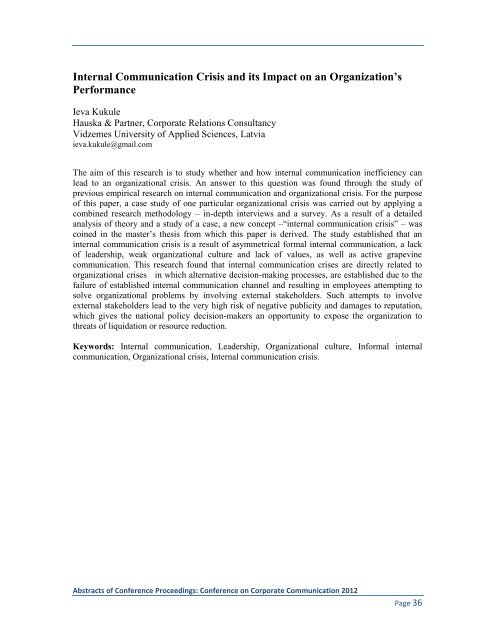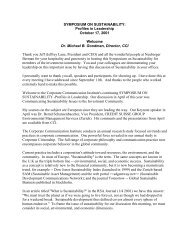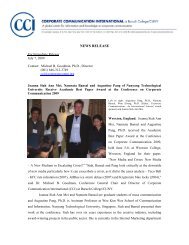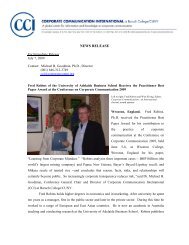Proceedings: Conference on Corporate Communication 2012 Page 1
Proceedings: Conference on Corporate Communication 2012 Page 1
Proceedings: Conference on Corporate Communication 2012 Page 1
You also want an ePaper? Increase the reach of your titles
YUMPU automatically turns print PDFs into web optimized ePapers that Google loves.
Internal Communicati<strong>on</strong> Crisis and its Impact <strong>on</strong> an Organizati<strong>on</strong>’s<br />
Performance<br />
Ieva Kukule<br />
Hauska & Partner, <strong>Corporate</strong> Relati<strong>on</strong>s C<strong>on</strong>sultancy<br />
Vidzemes University of Applied Sciences, Latvia<br />
ieva.kukule@gmail.com<br />
The aim of this research is to study whether and how internal communicati<strong>on</strong> inefficiency can<br />
lead to an organizati<strong>on</strong>al crisis. An answer to this questi<strong>on</strong> was found through the study of<br />
previous empirical research <strong>on</strong> internal communicati<strong>on</strong> and organizati<strong>on</strong>al crisis. For the purpose<br />
of this paper, a case study of <strong>on</strong>e particular organizati<strong>on</strong>al crisis was carried out by applying a<br />
combined research methodology – in-depth interviews and a survey. As a result of a detailed<br />
analysis of theory and a study of a case, a new c<strong>on</strong>cept –“internal communicati<strong>on</strong> crisis” – was<br />
coined in the master’s thesis from which this paper is derived. The study established that an<br />
internal communicati<strong>on</strong> crisis is a result of asymmetrical formal internal communicati<strong>on</strong>, a lack<br />
of leadership, weak organizati<strong>on</strong>al culture and lack of values, as well as active grapevine<br />
communicati<strong>on</strong>. This research found that internal communicati<strong>on</strong> crises are directly related to<br />
organizati<strong>on</strong>al crises in which alternative decisi<strong>on</strong>-making processes, are established due to the<br />
failure of established internal communicati<strong>on</strong> channel and resulting in employees attempting to<br />
solve organizati<strong>on</strong>al problems by involving external stakeholders. Such attempts to involve<br />
external stakeholders lead to the very high risk of negative publicity and damages to reputati<strong>on</strong>,<br />
which gives the nati<strong>on</strong>al policy decisi<strong>on</strong>-makers an opportunity to expose the organizati<strong>on</strong> to<br />
threats of liquidati<strong>on</strong> or resource reducti<strong>on</strong>.<br />
Keywords: Internal communicati<strong>on</strong>, Leadership, Organizati<strong>on</strong>al culture, Informal internal<br />
communicati<strong>on</strong>, Organizati<strong>on</strong>al crisis, Internal communicati<strong>on</strong> crisis.<br />
Abstracts of <str<strong>on</strong>g>C<strong>on</strong>ference</str<strong>on</strong>g> <str<strong>on</strong>g>Proceedings</str<strong>on</strong>g>: <str<strong>on</strong>g>C<strong>on</strong>ference</str<strong>on</strong>g> <strong>on</strong> <strong>Corporate</strong> Communicati<strong>on</strong> <strong>2012</strong><br />
<strong>Page</strong> 36
















